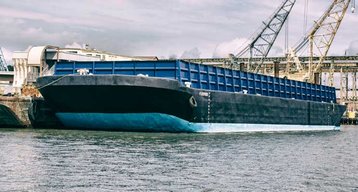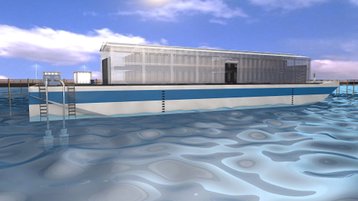The idea of a data center built in a boat was first “floated” a few years ago, but now it seems it is pretty much ready to set sail.
In 2008, a Google patent surfaced in which the search giant proposed data centers on boats moored out at sea, where they could harvest wave energy to generate power, and use sea water in a secondary cooling circuit, making them highly efficient.
Stuck on the slipway
That idea hasn’t come to fruition, and we’d have to guess that at least part of the difficulty would be in getting reliable network connections to the craft, and some issues with convincing potential customers that these things would be disaster-proof.
But, round about the same time Google was playing with that idea, another venture was under way: International Data Security (IDS) planned to convert reconditioned ships into data centers.
You see, IT on ships is nothing new - the Navy has plenty of servers on its ships, and IDS was led by former US Navy Admiral Richard Naughton (who once commanded the nuclear aircraft carrier, USS Enterprise).
IDS pointed out that ships also have diesels and fuel in situ already, so any data center could be powered for a month using the resources on board. IDS wasn’t planning on using wave power: these ships would be moored in a suitable harbor, and take power and network connections from cables.
Once again, though, IDS didn’t actually get as far as launching a data center, and folded after Naughton died in 2011.
Bobbing up again
Now, it looks like it could be third time lucky for the floating data center idea. Nautilus Data Technologies has tested a floating data center at a dockyard 20 miles from San Francisco, and plans to launch a commercial version by early in 2016.
There is some continuity with the earlier company - Nautilus founder Arnold Magcale is a Navy veteran who also worked at IDS.
Nautilus has tweaked and improved the idea considerably. It is using reconditioned barges, which are used for construction. They cover a big area, and have little extraneous superstructure to rebuild.
Nautilus plans to put sealed power and cooling systems below deck, and build the data center itself in a superstructure. The test only had five racks, but a fully built up barge could hold up to 800 racks.
With water cooling, Nautilus claims it can be a PUE (power usage effectiveness) as low as 1.045. Just as importantly for drought-stricken California, the barge facility would consume virtually no water.
The other benefits Nautilus promises include the ability to deploy the data center anywhere round the world - or at least, anywhere with a suitable harbor, either on the coast or on a navigable river.
It’s a big step from a five-rack demo to a full-scale data center, and Nautilus will have to face some stiff questions from customers. A data center floating on water might be more vulnerable to sabotage than one on dry land with walls around it.
But ships already carry valuable cargo - and people - into harbors, which have procedures for protecting them. Nautilus will have to work hard to convince the data passengers to get on board, but I think it has a decent chance of actually launching.




